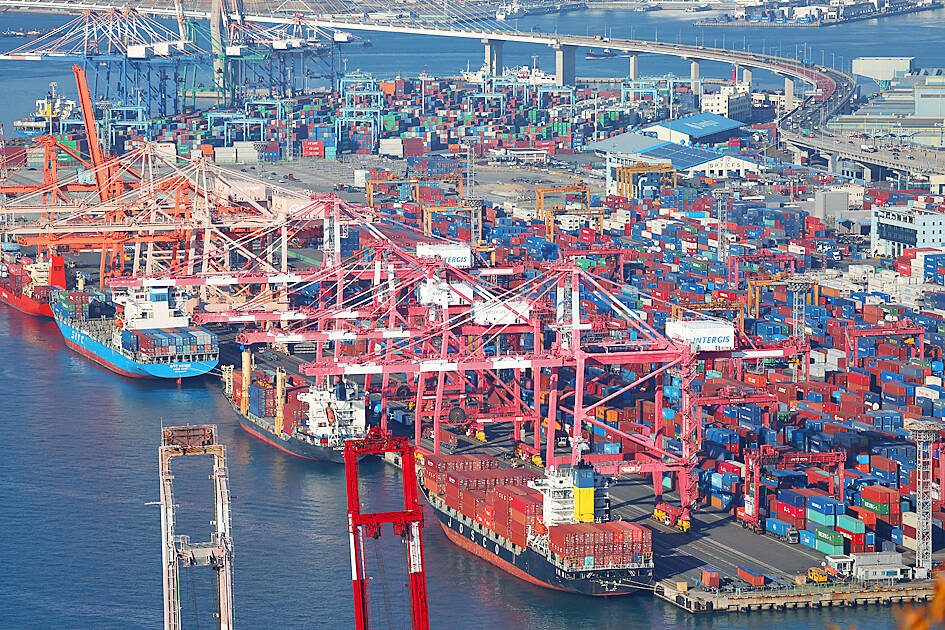South Korea’s export growth returned to a double-digit clip last month, an outcome that bodes well for the economic outlook and reflects the resilience of global demand for technology products.
Shipments that reflect working-day differences increased 13.7 percent from a year earlier, according to data released yesterday by the Korea Customs Service.
Without the adjustment, headline exports rose 11.4 percent while overall imports increased by 6 percent. The trade surplus came to US$3.8 billion.

Photo: EPA-EFE
Exports are the leading engine of South Korea’s economic growth, with semiconductors, cars and refined oil products among the key products that drive the overall performance. Authorities expect the nation’s economic growth to accelerate to the mid-2 percent range this year, thanks in part to a resurgence in global trade.
In particular, a global frenzy for artificial intelligence (AI) development has been a boon for South Korean chipmakers, including Samsung Electronics Co and SK Hynix Inc.
Last month, semiconductor exports rose 38.8 percent from a year earlier, according to yesterday’s data. South Korea accounts for the largest share of global memorychip sales.
Demand has been led by major economies such as the US, where Nvidia Corp has pioneered the development of AI chips, and where booming demand for electric vehicles has benefited South Korea’s carmakers. China has also been a major buyer of the country’s electronics and chips.
The US has at times outweighed China as a source of demand for South Korean products since late last year, marking a turning point in Seoul’s relations with its two largest trading partners.
South Korea has encouraged exporters to diversify their sales routes to reduce exposure to geopolitical risks stemming from simmering trade tensions between Washington and Beijing. China’s cloudy economic outlook creates another incentive.
“There are risks to increasing trade dependence on the United States, such as possible shocks to the financial, fiscal, and business environments,” Je Heon Kim, interim director at the Korea Economic Institute of America, said in a note.
“South Korea must prepare and manage these risks by continuing to diversify its trade and supply chain,” he said.
South Korea’s manufacturers are embedded across a wide array of global supply chains, and therefore their performance serves as a barometer of the vitality of world commerce.
The nation’s export performance has been a factor deterring South Korea’s central bank from making an early policy pivot.
While the US Federal Reserve is widely expected to start cutting interest rates this month, economists cautiously forecast the Bank of Korea would wait until next month or later to lower rates in a bid to address sluggish consumption.

The Eurovision Song Contest has seen a surge in punter interest at the bookmakers, becoming a major betting event, experts said ahead of last night’s giant glamfest in Basel. “Eurovision has quietly become one of the biggest betting events of the year,” said Tomi Huttunen, senior manager of the Online Computer Finland (OCS) betting and casino platform. Betting sites have long been used to gauge which way voters might be leaning ahead of the world’s biggest televised live music event. However, bookmakers highlight a huge increase in engagement in recent years — and this year in particular. “We’ve already passed 2023’s total activity and

Nvidia Corp CEO Jensen Huang (黃仁勳) today announced that his company has selected "Beitou Shilin" in Taipei for its new Taiwan office, called Nvidia Constellation, putting an end to months of speculation. Industry sources have said that the tech giant has been eyeing the Beitou Shilin Science Park as the site of its new overseas headquarters, and speculated that the new headquarters would be built on two plots of land designated as "T17" and "T18," which span 3.89 hectares in the park. "I think it's time for us to reveal one of the largest products we've ever built," Huang said near the

China yesterday announced anti-dumping duties as high as 74.9 percent on imports of polyoxymethylene (POM) copolymers, a type of engineering plastic, from Taiwan, the US, the EU and Japan. The Chinese Ministry of Commerce’s findings conclude a probe launched in May last year, shortly after the US sharply increased tariffs on Chinese electric vehicles, computer chips and other imports. POM copolymers can partially replace metals such as copper and zinc, and have various applications, including in auto parts, electronics and medical equipment, the Chinese ministry has said. In January, it said initial investigations had determined that dumping was taking place, and implemented preliminary

CUSTOMERS’ BURDEN: TSMC already has operations in the US and is a foundry, so any tariff increase would mostly affect US customers, not the company, the minister said Taiwanese manufacturers are “not afraid” of US tariffs, but are concerned about being affected more heavily than regional economic competitors Japan and South Korea, Minister of Economic Affairs J.W. Kuo (郭智輝) said. “Taiwan has many advantages that other countries do not have, the most notable of which is its semiconductor ecosystem,” Kuo said. The US “must rely on Taiwan” to boost its microchip manufacturing capacities, Kuo said in an interview ahead of his one-year anniversary in office tomorrow. Taiwan has submitted a position paper under Section 232 of the US Trade Expansion Act to explain the “complementary relationship” between Taiwan and the US